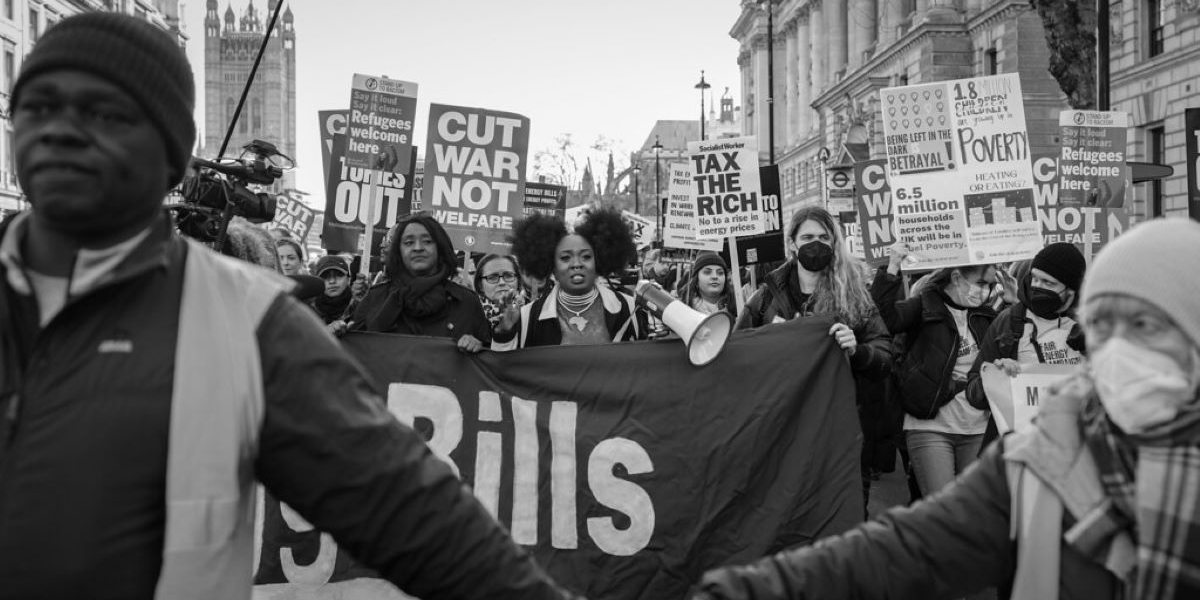Workers have lost nearly £10,000 in the last nine years. Guardian journalist Aditya Chakrabortty has shown that if the same share of Gross Domestic Product was paid out in wages today as it was in 1976, the average working-age household would have an extra £9,744 a year. This is why many people don’t have enough money for life’s basics.
Workers haven’t lost this £10,000 a year through laziness––it was part of a calculated strategy to shift more wealth to capital. Politicians from Thatcher onwards have attacked trade unions, undermined labour rights, and crowed over the result as a ‘flexible labour market’. What they have created is a low-wage workforce, in a low-growth economy ruled by politicians with low ambitions for everyone except themselves.
To take just one example from the current resurgence in trade union campaigns, the value of NHS consultants’ take-home pay has fallen by more than a third in the last 14 years. It seems that the solution to every crisis, whether it be the 2008 banking crash, the fuel crisis, or labour shortages, is always the same: squeeze the share of wealth that trickles down to the workforce.
This missing £10,000 per household per year is not a case of what we might have won over the last half a century. It is what we would have won, if labour had been able to maintain the power it had in the 1970s in its struggle with capital. But the cost-of-living crisis, exacerbated if not entirely caused by the reckless ideological budget of Liz Truss and the shortest government in history, has pushed many in our communities from struggling with chronic poverty into acute financial crisis.
The stirring of the giants
Unions, those sleeping giants of the social justice movement, have begun to stir. While strike figures are historically still low, we have been experiencing a strike wave not seen since the 1970s. The latest figures available for March this year show that 556,000 days were lost to strike action. Workers in schools, the health service, civil service, post, transport, higher education, and rail have all withdrawn their labour.
But it is not just the poorest in society who are demanding we get ‘some of our own back’. For the first time ever we’ve seen criminal barristers organise, strike and win. And now, those NHS consultants, long seen as a privileged strata, have found themselves ‘proletarianised’ and have responded in the only effective way that proletarians can – by collectivising their grievances, and voting overwhelmingly, for the first time in their history, to strike.
As workers rediscover collective action as their most effective tool, questions inevitably arise about when to use it, how to judge its effectiveness, and perhaps most challenging, when to settle a dispute, even if workers have not won everything they deserved. Economic battles are never about what is fair, but always about whether we have the power to win what is fair.
A fairer world, as well as fairer wages
Unions are of course about more than just wages. As the film Pride celebrates, unions have often been at the forefront of defending our right to freely live our own identities. At the infamous Grunwick dispute in the 1970s, the whole movement came together, to defend strikers in a predominantly migrant and female workforce. In 1976, workers at Lucas Aerospace fought to transition their jobs from producing military hardware to socially useful products. Such examples show unions at their best providing hope not just for fair wages, but a fairer world.
Yet unions are complex and at times infuriating institutions. Today, unions are nominally in favour of a just transition to a green economy, but intensely defensive about the prospect of losing any jobs from the carbon economy.
While trade unions have excellent policies on equality issues, too often they are absent when it comes to defending asylum seekers from demonisation. Many of the recent wins on gender pay equality have been led by no-win no-fee lawyers, rather than union organising, and the Living Wage Foundation – which ensures annual pay rises for 430,000 low paid workers – emerged from the voluntary sector, not the union movement. Meanwhile, for the second time in just over two years an independent inquiry has found bullying, misogyny, cronyism and sexual harassment endemic within unions.
Unions are complex and contradictory, but powerful, bodies. As the sleeping giant awakes, there could be no better time for a new organising conference on workplace justice exploring how we can make our unions the very best version of what they have the potential to be, and ensure that the energy and knowledge of the voluntary sector is not lost.
The first New Organising Conference
Red Pepper is proud to be a media partner to the first New Organising Conference to be held in Liverpool over the weekend of 8–10 September 2023. The conference, organised by the Ella Baker School of Organising, and the Network for Social Change, is for anyone interested in organising for justice at work, and sessions will be designed to share the knowledge that everyone brings into the room.
Sessions will explore varied topics, from learning from liberation movements to organising and faith; from researching your employer to the role of art film and music in social change; from just transition in a global context to digital tools. We hope it will be the first of many conferences to come.










